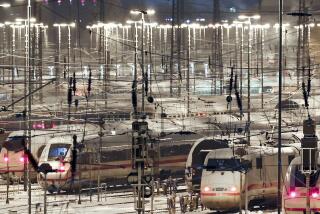Rail Workers Stage One-Day ‘Eurostrike’
- Share via
PARIS — Railroad workers alarmed at plans for deregulation of their industry staged the closest thing yet to a “Eurostrike” on Monday, stopping work or protesting in more than half a dozen European Union member nations.
Traffic jams up to 25 miles long were reported at morning rush hour on the roads around Brussels, where all trains ground to a halt. In Paris, where the strike hit regional rail service hard, grumbling commuters also were forced to pile into cars or pack into the underground Metro, which was unaffected.
The spark for the coordinated one-day labor action was a proposal from the European Union’s executive to allow competition for 25% of the rail freight market over the next 10 years.
Union leaders are wary because liberalization has led to big job cuts in many of Western Europe’s former state-owned telecommunications and airline companies. They insist on safeguarding the national monopoly status enjoyed by most countries’ railroads.
“We have the example of the United Kingdom, where liberalization and privatization resulted in the loss of one-third of the jobs at British Railways,” said Sabine Trier, spokeswoman for the Brussels-based European Federation of Transport Workers. “The other fear is that with competition, with new entrants, the pressures of competition will lead to a deterioration of social standards, that working conditions will be diminished.”
In Greece, trains halted at midnight Sunday, and traffic wasn’t expected to resume for 24 hours. In Belgium, the one-day strike also was a complete shutdown.
In France, an average of one train in three was running Monday, the French national railways said. Only eastern lines and the Eurostar, which links Paris and London, were functioning normally.
Spain’s conservative government of Prime Minister Jose Maria Aznar insisted that minimum service be assured, and some trains ran on regional and national lines. The timetable of the country’s only high-speed rail line, between Madrid and Seville, was unaffected.
In Luxembourg and Portugal, rail workers decided on a two-hour job stoppage. Their counterparts in Austria, Britain, Germany and the Netherlands limited themselves to news conferences, leaflets and statements to their governments.
On Nov. 30, transport ministers from the 15 EU member countries will review a proposal to open up the rail sector, in part to free market forces. Neil Kinnock, EU transportation commissioner, says 500,000 jobs have been lost in the past 15 years, and that railroads must change to stave off competition from road transport.
“Our proposals do not pose a threat to jobs,” Kinnock, a former leader of Britain’s Labor Party, said Sunday. “The great and continuing menace to jobs comes from the way in which rail is losing shares of the transport market.”
Kinnock contends that national rail operators, such as France’s SNCF, keep the market to themselves by controlling the cost of using their tracks. With the support of Britain and EU member countries in northern Europe, he proposes that governments be compelled to set up an independent regulator that will set rates at which private companies would be allowed to run their own freight and passenger trains on those tracks.
The commissioner wants 5% of freight traffic opened to competition immediately, and 25% in 10 years.
Union officials counter that railroads must bear environmental and social costs that trucking companies don’t have to pay. And railroads, they maintain, shouldn’t be subjected to the market’s whims because they are a public service as well as a business.
Meanwhile, outside the EU, Polish Transport Minister Eugeniusz Morawski resigned Monday, saying he could not reform the ailing state railways because of strong union opposition, the government’s spokesman said.
More to Read
Sign up for Essential California
The most important California stories and recommendations in your inbox every morning.
You may occasionally receive promotional content from the Los Angeles Times.













